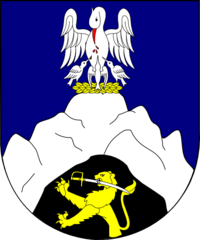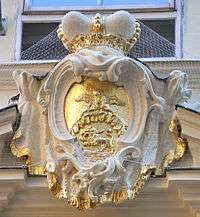Batthyány
Batthyány (Hungarian: [ˈbɒccaːɲi]) is the name of an ancient and distinguished Hungarian Magnate family. Members of this family bear the title Count/Countess (Graf/Gräfin) Batthyány von Német-Ujvar respectively, while the title of Prince (Fürst) von Batthyány-Strattmann is reserved only for the Head of the family. A branch of the family (Croatian: Baćan) was notable in Croatia as well, producing several Bans (viceroys) of Croatia in the 16th, 17th and 18th century.


The Batthyány family can trace its roots to the founding of Hungary in 896 CE by Árpád. The family derives from a chieftain called Örs.[1][2][3] Árpád had seven chieftains, one by the name of Örs, which later became Kővágó-Örs. In 1398 Miklós Kővágó-Örs married Katalin Battyány. King Zsigmond (Sigismund) gave Miklós the region around the town of Battyán (now called Szabadbattyán) and he took the name Batthyány (lit. "from Battyán"). The family were first mentioned in documents in 1398 and have had their ancestral seat in Güssing in the Austrian region of Burgenland since 1522. There the family meets once a year for a so-called Familientag (family gathering). Currently, the family has about 60 name bearers who live mainly in Austria, but also in Hungary, Germany, United States and South America. The family is headed by Prince Laszlo Pascal Batthyány-Strattmann, who lives in Vienna.
In 1570, Boldizsár Batthyány transformed the seat of the family, Güssing, into the center of Protestantism in the region. His descendant Ádám Batthyány (1610–1659), however, was Catholic and founded a Franciscan monastery in Güssing. Lajos Batthyány became the first Prime Minister of Hungary during the Hungarian Revolution of 1848 and was executed in Pest in 1849. After 1945 the Batthyány family's property was largely expropriated in Hungary and other countries under Communist rule, although they retained their property in Austria. The current family members have strong ties to Hungary currently.
Family members
- Boldizsár Batthyány (1543–1590), baron, well-educated humanist, became Protestant in 1570, protector of the botanist Carolus Clusius
- Ádám Batthyány (1610–1659), count, Founder of the Franciscan monastery in Güssing
- Károly József Batthyány (1698–1772), Austrian Field Marshal and later educator of Joseph II, Ban (viceroy) of Croatia
- József Batthyány (1727–1799), bishop
- Ignác Batthyány (1741–1798), bishop and founder of the Batthyaneum Library, Alba Iulia, now Romania
- Kázmér Batthyány (1807–1854), politician, minister in the Hungarian Revolution of 1848
- Franciska Batthyány (1802–1861), born Széchenyi
- Lajos Batthyány (1807–1849), executed, first Hungarian Prime Minister
- Count József Sándor Batthyány (1777–1812), his father
- Gusztáv, 5th Prince Batthyány-Strattmann (1803–1883), English sportsman, Thoroughbred racehorse owner/breeder
- Edmund Gustavus, 6th Prince Batthyany-Strattmann (1826–1914)
- Ludovika Olga Karoline Philippine Antonia Batthyany (1869–1939)
- Count Tivadar Batthyány (1859–1931)
- László, 7th Prince Batthyány-Strattmann (1870–1931), ophthalmologist, beatified in 2003
- Countess Margit Batthyány (1911–1989) de:Margit von Batthyány, lived until the end of World War II on Castle Rechnitz (Burgenland) where she was engaged in breeding horses and maintaining a reconvalescence home for members of the SS. Her involvement in the infamous Rechnitz massacre[4] is still controversial.
- Sacha Battyhány Swiss journalist and writer, author of the book "A Crime in the Family" about the participation of Comtesse Margit Battyhány and other members of the family in the Rechnitz massacre[5]
See also
References
- August Ernst, Geschichte des Burgenlandes, Oldenbourg Wissenschaftsverlag, 1991, p.140
- András Koltai, Adam Batthyány und seine Bibliothek, Országos Széchényi Könyvtár, 2002, p.292
- Miklós Füzes, Batthyány Kázmér, Gondolat, 1990, p. 5
- http://www.signandsight.com/features/1591.html
- http://www.haaretz.com/world-news/europe/.premium-1.798168
External links
- Family website
- Archival material (ca. 212 running meters): The Batthyány Family Archive at the National Archives of Hungary [P (4545)]
- Archival material (about 200 records): Batthyány Family Collection at the National Library of Israel (ARC. 4* 2031)
- Shaul Greenstein, The Hungarian Noble Family That Took in the Exiled Jews, The Librarians, Blog of the National Library of Israel, December 18th, 2018